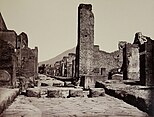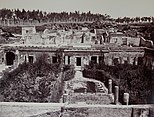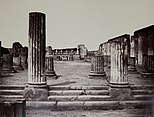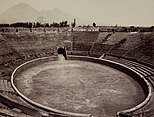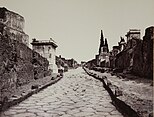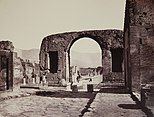Giorgio Sommer: Difference between revisions
m Adding local short description: "German photographer (1834-1914)", overriding Wikidata description "German photographer" (Shortdesc helper) |
|||
| (31 intermediate revisions by 17 users not shown) | |||
| Line 1: | Line 1: | ||
{{ |
{{Short description|German photographer (1834–1914)}} |
||
{{Infobox person |
{{Use dmy dates|date=September 2024}}{{Infobox person |
||
|name=Giorgio Sommer |
| name = Giorgio Sommer |
||
|image=Giorgio Sommer with his son Edmondo in 1864- self portrait.jpg |
| image = Giorgio Sommer with his son Edmondo in 1864- self portrait.jpg |
||
|birth_date={{Birth date|1834|9|2| |
| birth_date = {{Birth date|1834|9|2|df=y}} |
||
|birth_place=[[Frankfurt am Main]] |
| birth_place = [[Frankfurt am Main]], [[German Confederation]] |
||
|death_date={{death date and age|1914|8|7|1834|9|2| |
| death_date = {{death date and age|1914|8|7|1834|9|2|df=y}} |
||
|death_place=[[Naples]], [[Italy]] |
| death_place = [[Naples]], [[Kingdom of Italy]] |
||
|alma_mater= |
| alma_mater = |
||
|spouse= |
| spouse = |
||
|children= |
| children = |
||
|awards= |
| awards = |
||
|occupation=Photographer |
| occupation = Photographer |
||
}} |
|||
|nationality={{GER}}}} |
|||
'''Giorgio Sommer''' (1834–1914) was |
'''Giorgio Sommer''' (1834–1914) was one of Europe's most important and prolific photographers of the 19th century.<ref>{{Cite journal |last=Miraglia |first=Marina |date=1996-03-01 |title=Giorgio Sommer's Italian journey: Between tradition and the popular image |url=https://doi.org/10.1080/03087298.1996.10443607 |journal=History of Photography |volume=20 |issue=1 |pages=41–48 |doi=10.1080/03087298.1996.10443607 |issn=0308-7298}}</ref> Active from 1857 to 1888, he produced thousands of images of archeological ruins, landscapes, art objects and portraits. |
||
He was born in [[Frankfurt am Main]] (modern-day [[Germany]]), where he studied business. Sommer opened his first photography studio in [[Switzerland]], where he made relief images of mountains for the Swiss government. In 1856, he moved his business to [[Naples]] and later (1866) formed a partnership with fellow German photographer {{Ill|Edmund Behles|it|Edmondo Behles}} (also known as Edmondo Behles), who owned a studio in [[Rome]]. Operating from their respective Naples and Rome studios, [[Sommer and Behles]] became one of the largest and most prolific photography concerns in Italy. |
|||
He held studios in Naples at: |
He held studios in Naples at: |
||
| Line 23: | Line 23: | ||
* Piazza della Vittoria |
* Piazza della Vittoria |
||
Sommer's catalog included images from the [[Vatican Museum]], the [[National Archaeological Museum, Naples|National Archeological Museum at Naples]], the Roman ruins at [[Pompeii]], as well as street and architectural scenes of Naples, [[Florence]], [[Rome]], [[Capri]] and [[Sicily]].<ref>{{Cite journal |last=Barker |first=Craig |title=Black and white Pompeii |url=https://search.informit.org/doi/abs/10.3316/ielapa.517236779572105 |journal=Teaching History |volume=49 |issue=3 |pages=10–14 }}</ref> Most notably, Sommer published his comprehensive album ''Dintorni di Napoli'', which contained over one hundred images of everyday scenes in Naples. In April 1872, he documented a very large eruption of [[Mount Vesuvius]] in a series of stunning photographs. |
|||
Sommer and Behles exhibited extensively and earned numerous honors and prizes for their work ([[London]] 1862, [[Paris]] 1867, [[Vienna]] 1873, [[Nuremberg]] 1885). At one time, Sommer was appointed official photographer to King [[Victor Emmanuel |
Sommer and Behles exhibited extensively and earned numerous honors and prizes for their work ([[London]] 1862, [[Paris]] 1867, [[Vienna]] 1873, [[Nuremberg]] 1885). At one time, Sommer was appointed official photographer to King [[Victor Emmanuel II]] of Italy. |
||
Sommer was involved in every aspect of the photography business. He published his own images that he sold in his studios and to customers across Europe. In later years, he photographed custom images for book illustrations, as well as printing his own albums and [[postcard]]s. Sommer worked in all the popular formats of his day: [[carte de visite]], [[stereoview]], and large [[albumen]] prints (approximately |
Sommer was involved in every aspect of the photography business. He published his own images that he sold in his studios and to customers across Europe. In later years, he photographed custom images for book illustrations, as well as printing his own albums and [[postcard]]s. Sommer worked in all the popular formats of his day: [[carte de visite]], [[stereoview]], and large [[albumen]] prints (approximately {{nowrap|8 × 10}}) which were sold individually and in bound albums. |
||
The partnership with Behles ended in 1874, after which each photographer continued his own business. In Naples, Sommer opened a total of four additional studios: at No. 4 and No. 8 Monte di Dio, No. 5 Magazzino S. Caterina, and a last at Piazza della Vittoria. |
The partnership with Behles ended in 1874, after which each photographer continued his own business. In Naples, Sommer opened a total of four additional studios: at No. 4 and No. 8 Monte di Dio, No. 5 Magazzino S. Caterina, and a last at Piazza della Vittoria. |
||
Sommer died in |
Sommer died in Naples in 1914. |
||
== References == |
|||
{{Reflist}} |
|||
== Gallery == |
|||
<gallery widths="154px" heights="200px" class="center" caption="Selected works"> |
<gallery widths="154px" heights="200px" class="center" caption="Selected works"> |
||
File:1863 Sommer Menschliche Abgüsse aus Pompeij anagoria.JPG|''Pompeii: Human Casts found on |
File:1863 Sommer Menschliche Abgüsse aus Pompeij anagoria.JPG|''Pompeii: Human Casts found on 5 February 1863'', [[Städel]] |
||
File:Sommer, Giorgio (1834-1914) - n. 3142 - Capri, Marina - (ca. 1880).jpg|[[Marina Grande, Capri]], ca. 1880 |
File:Sommer, Giorgio (1834-1914) - n. 3142 - Capri, Marina - (ca. 1880).jpg|[[Marina Grande, Capri]], ca. 1880 |
||
File:Sommer, Giorgio (1834-1914) - n. 6110 - Napoli - via Roma - (alternative take).jpg|[[Naples]], 1880s |
File:Sommer, Giorgio (1834-1914) - n. 6110 - Napoli - via Roma - (alternative take).jpg|[[Naples]], 1880s |
||
File:Sommer, Giorgio (1834-1914) - n. 8935 - Vesuvio cratere 26 aprile 1883.jpg|''Crater of the [[Mount Vesuvius|Vesuvius]], |
File:Sommer, Giorgio (1834-1914) - n. 8935 - Vesuvio cratere 26 aprile 1883.jpg|''Crater of the [[Mount Vesuvius|Vesuvius]], 26 April 1883'' (Catalogue # 8935) |
||
File:Sommer, Giorgio (1834-1914) - n. 6144 - (Mangiamaccheroni).jpg|''Spaghetti eaters'' (Naples), before 1886 |
File:Sommer, Giorgio (1834-1914) - n. 6144 - (Mangiamaccheroni).jpg|''Spaghetti eaters'' (Naples), before 1886 |
||
File:Stabbia Street (Pompeii).jpg|''Stabbia Street (Pompeii)'', c. 1870 |
|||
File:Doimede's house (Pompeii).jpg|''Doimede's house (Pompeii)'', c. 1870 |
|||
File:Basilica (Pompeii).jpg|''Basilica (Pompeii)'', c. 1870 |
|||
File:Amphitheatre (Pompéi).jpg|''Amphitheatre (Pompeii)'', c. 1870 |
|||
File:The Temple of Venus (Pompeii).jpg|''The Temple of Venus (Pompeii)'', c. 1870 |
|||
File:The Temple of Isis (Pompeii).jpg|''The Temple of Isis (Pompeii)'', c. 1870 |
|||
File:The remains of Numerius Popidius Priscus' bakery (Pompeii).jpg|''The remains of Numerius Popidius Priscus' bakery (Pompeii)'', c. 1870 |
|||
File:Street of tombs (Pompeii).jpg|''Street of tombs (Pompeii)'', c. 1840 |
|||
File:Panorama of Pompeii with Via di Mercurio.jpg|''Panorama of Pompeii with Mount Vesuvius in the background (Pompeii)'', c. 1870 |
|||
File:Panorama Forum Rivile (Pompeii).jpg|''Panorama Forum Rivile (Pompeii)'', c. 1870 |
|||
File:Forum (Pompeii).jpg|''Forum (Pompeii)'', c. 1870 |
|||
File:Le_temple_de_Neptune,_Campanie,_Italie,_1854..jpg|''The Temple of Neptune'', c. 1854 |
|||
</gallery> |
</gallery> |
||
| Line 44: | Line 61: | ||
{{Commons category multi |Giorgio Sommer |width=21em}} |
{{Commons category multi |Giorgio Sommer |width=21em}} |
||
* {{Commons-inline|Catalogue of Giorgio Sommer's pictures}} |
* {{Commons-inline|Catalogue of Giorgio Sommer's pictures}} |
||
* [http://www.aeria.phil.uni-erlangen.de/photo_html/photographen/sommer.html Biography] (in German) |
* [http://www.aeria.phil.uni-erlangen.de/photo_html/photographen/sommer.html Biography] {{Webarchive|url=https://web.archive.org/web/20070817065546/http://www.aeria.phil.uni-erlangen.de/photo_html/photographen/sommer.html |date=2007-08-17 }} (in German) |
||
* [http://www.artcyclopedia.com/r/harvard-search.html?Sommer,%20Giorgio Images at Harvard University Art Museums] |
* [http://www.artcyclopedia.com/r/harvard-search.html?Sommer,%20Giorgio Images at Harvard University Art Museums] |
||
* [http://www.artnet.com/galleries/Exhibitions.asp?gid=424379903&cid=109584 Artnet] |
* [http://www.artnet.com/galleries/Exhibitions.asp?gid=424379903&cid=109584 Artnet] |
||
* [https://web.archive.org/web/20090507082738/http://photocollection.alonsorobisco.es/walking_italia.htm Images of Pompeii in 1870] |
* [https://web.archive.org/web/20090507082738/http://photocollection.alonsorobisco.es/walking_italia.htm Images of Pompeii in 1870] |
||
* [http://search.famsf.org:8080/search.shtml?keywords=giorgio+sommer Images of Fine Arts Museum of San Francisco]{{dead link|date=October 2017 |bot=InternetArchiveBot |fix-attempted=yes }} |
* [http://search.famsf.org:8080/search.shtml?keywords=giorgio+sommer Images of Fine Arts Museum of San Francisco]{{dead link|date=October 2017 |bot=InternetArchiveBot |fix-attempted=yes }} |
||
* [https://timesofmalta.com/articles/view/how-photo-becomes-drawing.1054720 How a photo becomes a drawing. Giorgio Sommer’s early photograph of Valletta’s Grand Harbour was published across Europe], ''Times of Malta'', 13 September 2023 |
|||
*[https://gallica.bnf.fr/ark:/12148/bpt6k3219297 Catalogo di fotografie d'Italia, Malta e Tunisi], G. Sommer & Figlio, "Catalogo di fotografie d'Italia, Malta e Tunisi". Napoli, Tipografia Scarpati, 1900 |
|||
{{Subject bar |
{{Subject bar |portal2=Visual arts |portal3=Arts}} |
||
{{Authority control}} |
{{Authority control}} |
||
{{DEFAULTSORT:Sommer, Giorgio}} |
{{DEFAULTSORT:Sommer, Giorgio}} |
||
[[Category:1834 births]] |
[[Category:1834 births]] |
||
Latest revision as of 08:52, 18 November 2024
Giorgio Sommer | |
|---|---|
 | |
| Born | 2 September 1834 |
| Died | 7 August 1914 (aged 79) |
| Occupation | Photographer |
Giorgio Sommer (1834–1914) was one of Europe's most important and prolific photographers of the 19th century.[1] Active from 1857 to 1888, he produced thousands of images of archeological ruins, landscapes, art objects and portraits.
He was born in Frankfurt am Main (modern-day Germany), where he studied business. Sommer opened his first photography studio in Switzerland, where he made relief images of mountains for the Swiss government. In 1856, he moved his business to Naples and later (1866) formed a partnership with fellow German photographer Edmund Behles (also known as Edmondo Behles), who owned a studio in Rome. Operating from their respective Naples and Rome studios, Sommer and Behles became one of the largest and most prolific photography concerns in Italy.
He held studios in Naples at:
- Strada di Chiaia 168
- Via Monte di Dio 4 and 8
- Piazza della Vittoria
Sommer's catalog included images from the Vatican Museum, the National Archeological Museum at Naples, the Roman ruins at Pompeii, as well as street and architectural scenes of Naples, Florence, Rome, Capri and Sicily.[2] Most notably, Sommer published his comprehensive album Dintorni di Napoli, which contained over one hundred images of everyday scenes in Naples. In April 1872, he documented a very large eruption of Mount Vesuvius in a series of stunning photographs.
Sommer and Behles exhibited extensively and earned numerous honors and prizes for their work (London 1862, Paris 1867, Vienna 1873, Nuremberg 1885). At one time, Sommer was appointed official photographer to King Victor Emmanuel II of Italy.
Sommer was involved in every aspect of the photography business. He published his own images that he sold in his studios and to customers across Europe. In later years, he photographed custom images for book illustrations, as well as printing his own albums and postcards. Sommer worked in all the popular formats of his day: carte de visite, stereoview, and large albumen prints (approximately 8 × 10) which were sold individually and in bound albums.
The partnership with Behles ended in 1874, after which each photographer continued his own business. In Naples, Sommer opened a total of four additional studios: at No. 4 and No. 8 Monte di Dio, No. 5 Magazzino S. Caterina, and a last at Piazza della Vittoria.
Sommer died in Naples in 1914.
References
[edit]- ^ Miraglia, Marina (1 March 1996). "Giorgio Sommer's Italian journey: Between tradition and the popular image". History of Photography. 20 (1): 41–48. doi:10.1080/03087298.1996.10443607. ISSN 0308-7298.
- ^ Barker, Craig. "Black and white Pompeii". Teaching History. 49 (3): 10–14.
Gallery
[edit]- Selected works
-
Pompeii: Human Casts found on 5 February 1863, Städel
-
Marina Grande, Capri, ca. 1880
-
Naples, 1880s
-
Crater of the Vesuvius, 26 April 1883 (Catalogue # 8935)
-
Spaghetti eaters (Naples), before 1886
-
Stabbia Street (Pompeii), c. 1870
-
Doimede's house (Pompeii), c. 1870
-
Basilica (Pompeii), c. 1870
-
Amphitheatre (Pompeii), c. 1870
-
The Temple of Venus (Pompeii), c. 1870
-
The Temple of Isis (Pompeii), c. 1870
-
The remains of Numerius Popidius Priscus' bakery (Pompeii), c. 1870
-
Street of tombs (Pompeii), c. 1840
-
Panorama of Pompeii with Mount Vesuvius in the background (Pompeii), c. 1870
-
Panorama Forum Rivile (Pompeii), c. 1870
-
Forum (Pompeii), c. 1870
-
The Temple of Neptune, c. 1854
External links
[edit] Media related to Catalogue of Giorgio Sommer's pictures at Wikimedia Commons
Media related to Catalogue of Giorgio Sommer's pictures at Wikimedia Commons- Biography Archived 2007-08-17 at the Wayback Machine (in German)
- Images at Harvard University Art Museums
- Artnet
- Images of Pompeii in 1870
- Images of Fine Arts Museum of San Francisco[permanent dead link]
- How a photo becomes a drawing. Giorgio Sommer’s early photograph of Valletta’s Grand Harbour was published across Europe, Times of Malta, 13 September 2023
- Catalogo di fotografie d'Italia, Malta e Tunisi, G. Sommer & Figlio, "Catalogo di fotografie d'Italia, Malta e Tunisi". Napoli, Tipografia Scarpati, 1900






